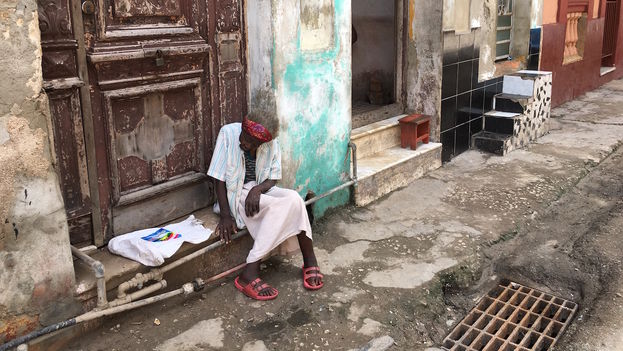
![]() 14ymedio, Carlos Alberto Montaner, Miami, 17 September 2017 — In the middle of the hurricane I received a mysterious photo of Fidel Castro. At the top it said: “Fidel resurrected.” Below the portrait the mystery was clarified: “His name is Irma.” The Commander was reincarnated as a ferocious hurricane.
14ymedio, Carlos Alberto Montaner, Miami, 17 September 2017 — In the middle of the hurricane I received a mysterious photo of Fidel Castro. At the top it said: “Fidel resurrected.” Below the portrait the mystery was clarified: “His name is Irma.” The Commander was reincarnated as a ferocious hurricane.
The joke has a serious basis Juan Manuel Cao, one of America TeVe’s leading journalists, explained it to me. Communism and hurricanes have many things in common. They leave society that suffers them without electricity, without food, without medicines, without clothes, without gasoline. The drinking water becomes an elusive trickle that fades with skill of Houdini. They are magicians. Everything disappears. Socialism is like this.
But both catastrophes differ in one key detail: hurricanes last only a few days and people look forward to the end of the water and the wind. Communism, on the other hand, lasts an eternity and, little by little, hopes of seeing the end vanish. We Cubans have been suffering for 58 years. Venezuelans, although they have not yet reached the sea of happiness, as announced by Hugo Chávez, began the journey almost 20 years ago. They are already close to the goal. May God take them confessed.
The Cuban Human Rights Foundation, chaired by Tony Costa, in a bulletin written by the historian Juan Antonio Blanco, adds a forceful denunciation in response to statements by dictator Raul Castro. The general explained that almost all the resources available to Cuba in the last quarter of 2017 will be used to rebuild the hotel infrastructure destroyed by Hurricane Irma.
The companies, almost all foreign, co-directed by Cuban generals, will have priority. If a street or a building has to be fixed, a power line or telephone has to be fixed, it will not be the Cubans, but the foreigners. It has always been like this. It is the government, without consulting the citizens, who will decide how it will spend the resources generated by the work of Cubans.
When these catastrophes occur, the cruel absurdity of the systems in which the government, owner of all property, of all resources, and of all decision-making mechanisms, chooses the certain bad luck of its subjects.
In societies in which private property prevails, citizens protect their assets through insurance, and if they do not have it, they acquire loans to repair their homes or estates. They do not expect the State to solve their most urgent needs because they know, as Ronald Reagan used to say, that there is no more dangerous creature than the one who tells us: “I am a representative of the government and I have come to solve your problems.”
In Cuba there are thousands of victims of hurricanes that happened six, seven or ten years ago, and who continue to live in temporary shelters that are falling apart. Often the aid that comes from abroad is then sold in dollars in special stores.
I remember a shocking revelation made me by Jaime Ortega, very upset, who was then bishop and soon cardinal, in the nineties, at my house in Madrid: when Germany, already reunited, tried to give thousands of tons of powdered milk, to be distributed by the Catholic charity Caritas, and their diplomats in Havana learned that the government sold these coveted gifts, the indignant representative of the Cuban government, a deputy foreign trade minister named Raul Taladrid, on the instructions of Fidel Castro, uttered a tremendous sentence that should pass to the universal history of infamy: “Cuban children will drink water with ashes before milk distributed by the Church.”
Now it was Irma’s turn. Little by little the country will erode sharply, from hurricane to hurricane, from storm to storm, until it becomes an incomprehensible ruin, as long as the current system continues. I am not surprised by the bitter joke. Fidel reincarnated in “Irma.” Tomorrow it will be as “Manuel” or “Carmen.” Until Cuba is a fuzzy memory, or until this chastened society can get rid of the heavy chain and take the long road to national reconstruction away from the socialist utopia.
